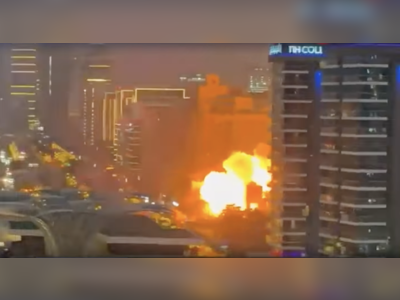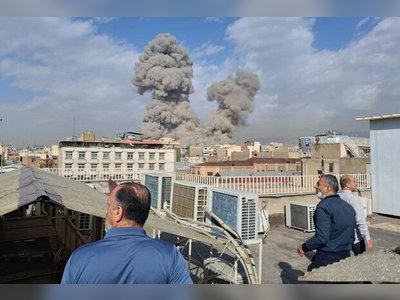'Whisper it quietly' … But Russia’s financial situation looks better than the West’s
Despite the barrage of sanctions that the Russian economy got hit with at the start of the Russian military operation in Ukraine, the West's economy seems to be taking the brunt of these sanctions instead of its intended target.
On Friday, Russia’s Central Bank cut interest rates by 3% (from 20 to 17%). And, though overall economic activity in Russia has declined, industrial production was up 4.5% in March. The Russian Prime Minister said that he expected that supply line problems caused by sanctions would be solved within the next 6–12 months. Inflation is at 14.7%, but the Central Bank suggested the worst of this inflationary impulse was over; bank deposits were growing and financial stability was returning.
Even London’s Financial Times notes signs that Russia’s “financial sector is finding its feet after the initial barrage from the sanctions”. And Russia’s oil and gas sales - at more than $1b a day in March - mean that it continues to accumulate foreign earnings that will help compensate for the reserves seized by the West. As things stand (i.e. barring a complete EU energy import ban), Russia should be able to replace those seized reserves - in short order.
The domestic banking sector also seems to have stabilised. The need for central bank liquidity has faded sharply and the commercial banking sector as a whole could soon end up having surplus deposits with the CBR, the Financial Times notes, quoting the Institute of International Finance analysis.
So, contrary to the G7’s expectation that western sanctions would collapse the Russian economy, the FT is saying: “Whisper it quietly ... Russia’s financial system seems to be recovering from the initial sanction shock”.
Ironically, Russia’s prospects in some respects look better than those of the West. Like Russia, Europe either already has – or soon will have - double-digit inflation. The big difference being that Russian inflation is falling, whereas Europe’s is spiking to the point (notably with food and energy prices), that these price hikes likely will spur popular outrage and protest.
Well … having got that wrong (the political crisis was pencilled-in for Russia, not for protests in Europe), EU states seem intent on doubling down: ‘If Russia hasn’t collapsed as expected, then Europe must go ‘the full Monty’: Just strip them of everything: No Russian ships entering EU ports; no trucks crossing EU frontiers; no coal; no gas – and no oil. ‘Not a euro reaching Russia’ is the cry.
On the face of it, this would be ‘nuts’. Take the experts’ words for it: there is no way for Europe to replace Russian energy from other sources in the next year -- not from America; not Qatar; nor Norway. But the European leadership, consumed by a frenzy of outrage at a flood of 'atrocity' images from Ukraine, and a sense that the ‘liberal world’ at any cost must prevent a loss in the Ukraine conflict, seems ready to go ‘whole hog’.
The higher energy costs implicit in stripping out Russian energy simply will eviscerate what remains of EU competitiveness – but what the heck! Zelensky! Ukraine!
Charles Moore, (a longstanding editor of mainstream British newspapers and The Spectator) says: “[I]f Russia wins, this means not only the destruction and enslavement of Ukraine, but also the overthrow of the world order by something infinitely crueller – an unholy alliance… From this, it follows that Ukraine must win, not just to secure its national rights, but for all our sakes. I know Ukraine is not in NATO, but Russia’s attack on that one country definitely amounts to an attack on all”.
"Whisper it quietly": The EU holds to a haughty conviction that it is the monopsony that can never be ignored. It is the market: the 400 million EU market. And monopsony (the opposite to a monopoly) is a market structure in which a single buyer (i.e. the EU) can control the world simply through exclusion from its market. Brussels bureaucrats believe it. This is how, they believe, they’ll bring down Russia, and save ‘our democracy’.
But, as Alexey Gromov, Chief Energy Director of the Institute of Energy and Finance in Moscow, explains: “Russia [has] changed the logistical supply chains to Asia already”. And that applies for gas and oil as well: “You can impose sanctions if there’s a surplus in the market. Now there’s a shortage of at least 1.5 million barrels of oil a day. We’ll be sending our supplies to Asia – with a discount”.
So why is Brussels so convinced that it can strip out Russian energy, and survive without riots in European streets at hyper-inflationary food and heating prices? Their thinking is a panglossian judgement that the EU can just about survive an energy squeeze through summer, and then by the autumn, a new ‘regime’ will be taking office in Russia in the wake of Putin’s ‘Ukraine débacle’ (of which they are convinced), which will be only too delighted to sell energy to Europe at discounted prices, for long enough to allow the EU to wean itself off Russian energy – for good. End of story (so they seem to believe).
But, say it quietly: The more the West execrates Russia in Ukraine and the more it parades its loathing of President Putin, the more determined are Russians to persevere in Ukraine, and fully to support Putin. The more the EU sanctions Russia, the more sentiment in Russia will favour depriving Europe of those myriad of key commodities (mostly unfamiliar to us as supplied from Russia) on which Europeans depend – but never knew it.
Even London’s Financial Times notes signs that Russia’s “financial sector is finding its feet after the initial barrage from the sanctions”. And Russia’s oil and gas sales - at more than $1b a day in March - mean that it continues to accumulate foreign earnings that will help compensate for the reserves seized by the West. As things stand (i.e. barring a complete EU energy import ban), Russia should be able to replace those seized reserves - in short order.
The domestic banking sector also seems to have stabilised. The need for central bank liquidity has faded sharply and the commercial banking sector as a whole could soon end up having surplus deposits with the CBR, the Financial Times notes, quoting the Institute of International Finance analysis.
So, contrary to the G7’s expectation that western sanctions would collapse the Russian economy, the FT is saying: “Whisper it quietly ... Russia’s financial system seems to be recovering from the initial sanction shock”.
Ironically, Russia’s prospects in some respects look better than those of the West. Like Russia, Europe either already has – or soon will have - double-digit inflation. The big difference being that Russian inflation is falling, whereas Europe’s is spiking to the point (notably with food and energy prices), that these price hikes likely will spur popular outrage and protest.
Well … having got that wrong (the political crisis was pencilled-in for Russia, not for protests in Europe), EU states seem intent on doubling down: ‘If Russia hasn’t collapsed as expected, then Europe must go ‘the full Monty’: Just strip them of everything: No Russian ships entering EU ports; no trucks crossing EU frontiers; no coal; no gas – and no oil. ‘Not a euro reaching Russia’ is the cry.
On the face of it, this would be ‘nuts’. Take the experts’ words for it: there is no way for Europe to replace Russian energy from other sources in the next year -- not from America; not Qatar; nor Norway. But the European leadership, consumed by a frenzy of outrage at a flood of 'atrocity' images from Ukraine, and a sense that the ‘liberal world’ at any cost must prevent a loss in the Ukraine conflict, seems ready to go ‘whole hog’.
The higher energy costs implicit in stripping out Russian energy simply will eviscerate what remains of EU competitiveness – but what the heck! Zelensky! Ukraine!
Charles Moore, (a longstanding editor of mainstream British newspapers and The Spectator) says: “[I]f Russia wins, this means not only the destruction and enslavement of Ukraine, but also the overthrow of the world order by something infinitely crueller – an unholy alliance… From this, it follows that Ukraine must win, not just to secure its national rights, but for all our sakes. I know Ukraine is not in NATO, but Russia’s attack on that one country definitely amounts to an attack on all”.
"Whisper it quietly": The EU holds to a haughty conviction that it is the monopsony that can never be ignored. It is the market: the 400 million EU market. And monopsony (the opposite to a monopoly) is a market structure in which a single buyer (i.e. the EU) can control the world simply through exclusion from its market. Brussels bureaucrats believe it. This is how, they believe, they’ll bring down Russia, and save ‘our democracy’.
But, as Alexey Gromov, Chief Energy Director of the Institute of Energy and Finance in Moscow, explains: “Russia [has] changed the logistical supply chains to Asia already”. And that applies for gas and oil as well: “You can impose sanctions if there’s a surplus in the market. Now there’s a shortage of at least 1.5 million barrels of oil a day. We’ll be sending our supplies to Asia – with a discount”.
So why is Brussels so convinced that it can strip out Russian energy, and survive without riots in European streets at hyper-inflationary food and heating prices? Their thinking is a panglossian judgement that the EU can just about survive an energy squeeze through summer, and then by the autumn, a new ‘regime’ will be taking office in Russia in the wake of Putin’s ‘Ukraine débacle’ (of which they are convinced), which will be only too delighted to sell energy to Europe at discounted prices, for long enough to allow the EU to wean itself off Russian energy – for good. End of story (so they seem to believe).
But, say it quietly: The more the West execrates Russia in Ukraine and the more it parades its loathing of President Putin, the more determined are Russians to persevere in Ukraine, and fully to support Putin. The more the EU sanctions Russia, the more sentiment in Russia will favour depriving Europe of those myriad of key commodities (mostly unfamiliar to us as supplied from Russia) on which Europeans depend – but never knew it.










